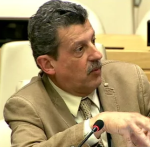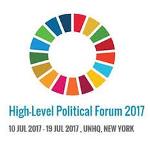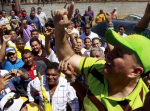Published on Sun, 2017-08-20 22:23
The Armenian government seeks to liberalize socioeconomic and political activities in a framework of respect for human rights and gender equality, acknowledges the national Social Watch report. Over the past 15 years, the poverty rate has fallen from 51 percent to 26.5 percent, but the unemployment rate is unchanged, which remains one of the main factors driving labor migration: almost one in four families (23%) in Armenia has members outside the country, of which 20 percent are in Russia and 3 percent in Europe. The analysis of the Center for Development of Civil society concludes that despite a certain increase in per capita income, the current level allows families to cover only the costs of food and some utilities, since the state's minimum wage and various allowances do not take into account needs for medical care, education, vacation time or cultural activities. |
Published on Thu, 2017-08-17 10:17
“Social Protection is a Human Right. Every right has a right holder and a duty bearer. We know who the right holders are: every human being, particularly those more in need of social protection: The right to be protected and cared is a right of children, the elderly, the sick, the people with disabilities" said Roberto Bissio, coordinator of Social Watch, speaking on behalf of the Global Coalition for Social Protection Floors (GCSPF) in the side event: “Global Partnership on Universal Social Protection: Ending Poverty by 2030” held during the HLPF on July 10th. |
Published on Wed, 2017-08-16 12:33
In discussions at the UN about achieving Agenda 2030, it has become de rigueur to highlight the role of the private sector. It is often introduced as the discovery of the idea that private sector investment and financing is indispensable to achieving Agenda 2030. For developed country diplomats and their associated experts this new celebrity treatment appears to be an article of faith, at least during negotiations on economic matters in the UN. |
Published on Mon, 2017-08-07 11:04
Reflections on the 2017 United Nations High-Level Political Forum on Sustainable Development. In his opening remarks, the UN Secretary-General said that 20 years ago “there was the idea that globalization would not only increase global wealth, but that it would trickle-down and would benefit everybody in our planet”. He went on to describe that at the present time, “globalization and technological progress have dramatically increased global trade and global wealth. It is true that the number of absolute poor has been reduced and that living conditions have improved all over the world but it is also true that globalization and technological progress together have been factors in the increase of inequality”. |
Published on Thu, 2017-08-03 09:29
The measures adopted by the Venezuelan government, in the context of the election of the Constituent Assembly and protests by those who question it, further aggravated the human rights situation in that country. On July 30, the government again responded with violence to demonstrations against it. On this occasion, ten people died, raising the number of people killed in protest situations to 119 in the last four months. According to investigations by the Public Prosecutor’s Office, a considerable percentage of these deaths resulted from shots fired by police and military officials. Other deaths are due to the actions of armed civilian groups that respond both to sectors of the opposition that propose an insurrectionary response and to para-state groups. In situations of protest, the state response must be based on the principle of protecting life; this emanates from states’ international human rights obligations. |
SUSCRIBE TO OUR NEWSLETTER







